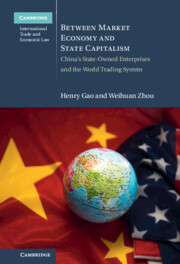 Between Market Economy and State Capitalism
Between Market Economy and State Capitalism WTO Litigation and Trade Negotiation
Published online by Cambridge University Press: 10 November 2022
Chapter 7 is dedicated to a more focused discussion of how to tackle China’s state capitalism in the WTO. The first option is utilising existing WTO rules, especially those China-specific provisions, to bring cases against China, which so far has not happened. This is partly due to the perception that WTO litigation does not work against China, an argument which we refute by referring to China’s good compliance record with WTO decisions. At the same time, we do agree that a more strategic approach should be taken in bringing such cases and proceed to suggest the types of cases that should be brought and how the evidentiary burden could be met. The second option is through trade negotiations. While bilateral negotiations such as the US–China Phase One deal do not really work, there is great potential in multilateral negotiations. Here, we caution against those advocating the exclusion of China in such rule-making efforts and argue that China should be engaged to make the negotiation fruitful. To make the discussions more productive, we also suggest certain guidelines to make sure that China will be more constructively engaged.
To save this book to your Kindle, first ensure no-reply@cambridge.org is added to your Approved Personal Document E-mail List under your Personal Document Settings on the Manage Your Content and Devices page of your Amazon account. Then enter the ‘name’ part of your Kindle email address below. Find out more about saving to your Kindle.
Note you can select to save to either the @free.kindle.com or @kindle.com variations. ‘@free.kindle.com’ emails are free but can only be saved to your device when it is connected to wi-fi. ‘@kindle.com’ emails can be delivered even when you are not connected to wi-fi, but note that service fees apply.
Find out more about the Kindle Personal Document Service.
To save content items to your account, please confirm that you agree to abide by our usage policies. If this is the first time you use this feature, you will be asked to authorise Cambridge Core to connect with your account. Find out more about saving content to Dropbox.
To save content items to your account, please confirm that you agree to abide by our usage policies. If this is the first time you use this feature, you will be asked to authorise Cambridge Core to connect with your account. Find out more about saving content to Google Drive.